#Erling Wold
Text

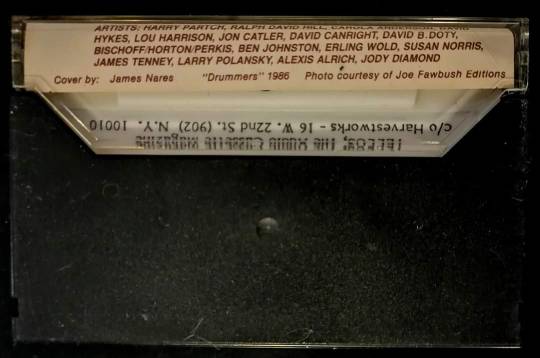
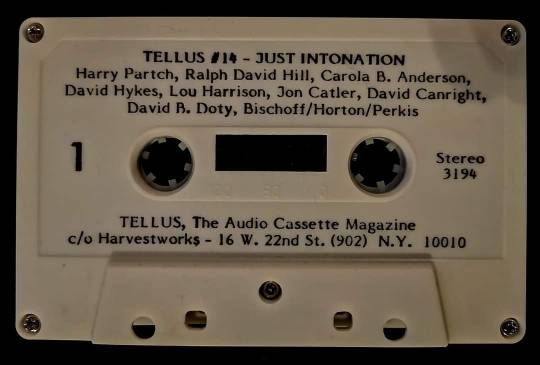
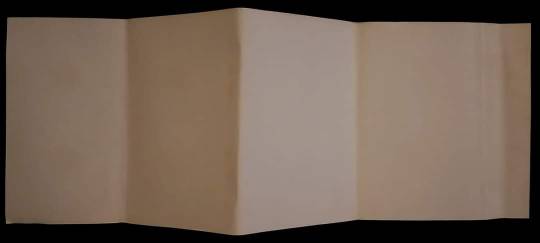
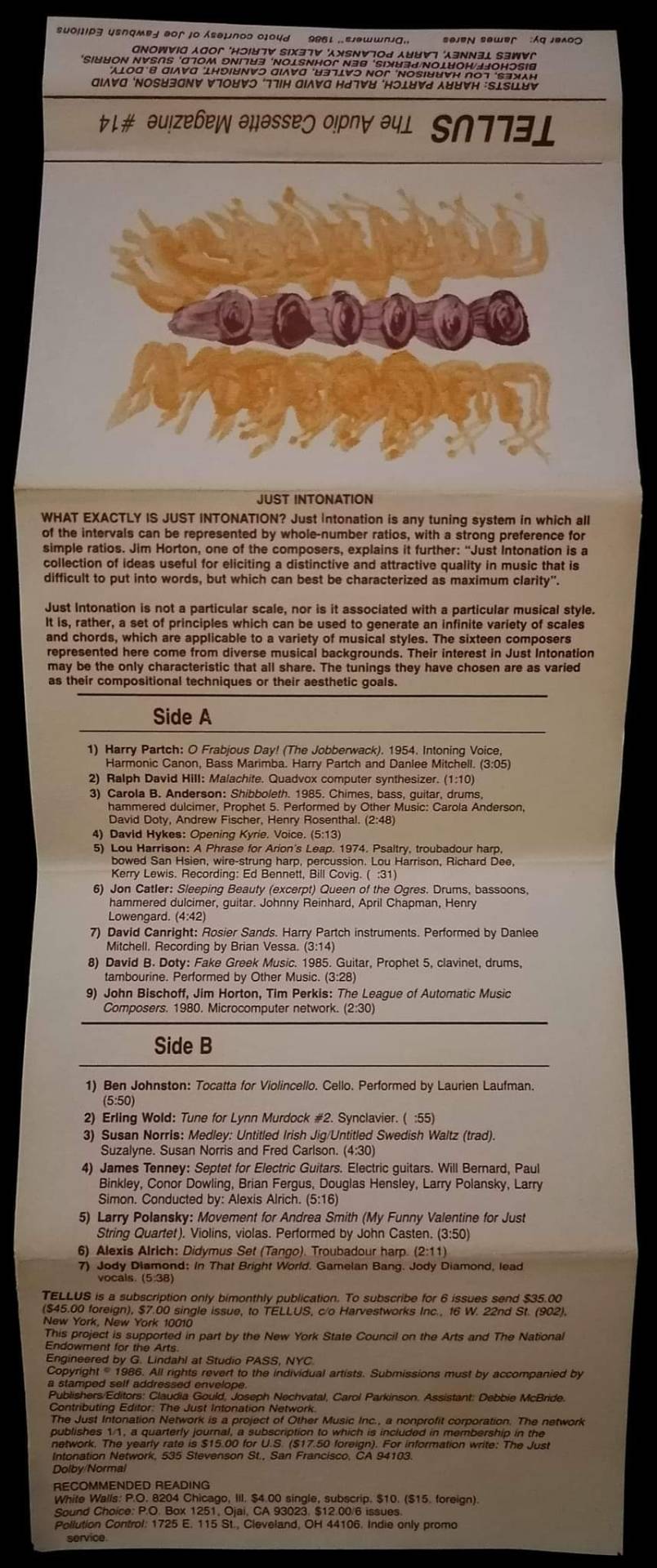
V/A
"Tellus #14 : Just Intonation"
(cassette. Tellus. 1986) [US]
youtube
#compilation#1986#cassette#usa#experimental#contemporary#avant garde#harry partch#David Hykes#Lou Harrison#Jon Catler#John Bischoff#League Of Automatic Music Composers#Ben Johnston#Erling Wold#James Tenney#Larry Polansky#Alexis Alrich#Youtube
4 notes
·
View notes
Photo

Erling Bjørnson, Bjørnstjerne Bjørnsons sønn, på Nedre Aulestad med hest
IDENTIFIER SS-AW-71
AVBILDET PERSON Bjørnson, Erling
History: Glassplatesamling etter Bernt Evenvold (Ben Evans). Samlingen ble tatt vare på av Arne Wold, som var sønn av Evenvolds onkel. Gitt til Maihaugen av Aslaug Wold, enke etter Arne. De fleste motivene er fra Follebu og Lillehammer. De er tatt i perioden 1896-1904, da fotografen reiste til USA. Noen senere kan være tatt av ham ved besøk i Norge i 1923 eller med hans kamera.
Fotografering - 1896 — 1904
FOTOGRAF Evenvold, Bernt (Ben Evans)
INSTITUTION Maihaugen
15 notes
·
View notes
Photo


A CHRONICLE OF THE REIGNS OF RICHARD II., HENRY IV., HENRY V., AND HENRY VI.RICHARD II. Of Kyng Richard the secunde aftir the Conquest, the sone of PrinceEdwarde; and of the risyng tyme; and of meny othir notablethyngis.*
[Concerning Henry the IVth’s reign]
A.D. 1399.
And whanne he hadde be there a litill tyme, ser Henri of Bolyng|broke, erl of Derby and duke of Hereforde, whom kyng Richard*. [Hoc anno obiit dux Lancas|triæ.] hadde exilid, heryng that his fader ser John of Gaunt, duke of Lancastre, was ded, cam doun out of ffraunce vnto Caleys.
And there mette with him maister Thomas Arundelle that was archebisshoppe of Cauntirbury, and the sone and heir of the erl of Arundelle, that was broke out of prison of the castelle of Reygate; and thay shippid at Caleys, and cam in to Englond, and landid at Rauenesporne in the*. [[July 4th.]] north cuntre.
And there mette with thaym the erlle of Northum|birlond withe a gret power to helpe and socoure the said duke, that cam for non othir entent, as he saide, thanne forto chalange the duchie of Lancastre his enheritaunce.
The duke of York that was lieutenaunt of Engelond wolde haue gon ayens thayme, but noman wolde folowe him; and ser William Scroope, tresorer of Englond, offrid men wonder large wageȝ, but he coude noman haue, for no money.
Thanne wroot the said duke of Hereforde to the citeȝeyns of Lon| [folio 152a] doun, and callid himself duke of Lancastre and stiward of Englond, and saide that he wolde refourme and amende that was amys; and anon Londoun him fauerid and supportid, and alle the kyngis castellis were delyuerid to the duke.
Ser William Scrooppe, tresorer of Engelonde, Busshe, Bagot, and Grene, knyghtis, that were the kyngis chief counselours, fledde in to the castel of Bristowe, and wolde haue gon in to Yrlond, but thay were take, and thair heddis smyte of: but Bagot ascapid in to Yrlonde and was take aftirwarde.
Whanne kyng Richarde herde telle alle this, he cam in haste out*. [[August 13th.]] of Yrlond in to Walis, and abood in the castell of fflynt to take counsel what was best to do; but no counsel cam to him, and alle his ost landid in diuers partieȝ and wolde not folowe him. Thanne ser Thomas Percy, stiward of the kyngis hous, brak the rod of his office in the halle befor alle men and saide, "The king wille no lenger holde householde," and anon alle the kyngis mayne forsook him, and lefte him alone.
Tho cursid the kyng the vntrouthe of Englond, and saide, "Allas! what trust is in this fals worlde!"
Thanne wrot the duke to the stiward of the Archebisshoppe of Cauntirbury, ser Roger Waldenne, commaundyng him on peyne of his hed to kepe alle the godis of the forsaid ser Roger to the vse of maister Thomas Arundelle, and anon the said Roger remeued alle his [folio 152b] iewelx out of the paleis of Cauntirbury, and thay were take at Rouchestre and put in to the castelle there to be kept safly.
Whanne this was ydo, the duke and maister Thomas Arundel*. [[August 19th.]] wente to the kyng to the castel of Flynt, and aftir a fewe wordis thay tolde him shortly he sholde no lenger regne; and thanne maister Thomas Arundelle saide vnto him in this wise:
"Thou art a fair man, but thou art falsest of alle menne. Thou promisist and assurid me, sweryng on Goddis Body, that thou woldes, do my brothir non harm; and whanne I hadde brouȝt him to thi presence, I myȝte nevir se him aftir. Thou also promisest me to calle me agayn in haste fro myn exile, and that ther sholde nevir be othir archebisshoppe of Caunterbury but I, whileȝ I livid; and now thou hast maad anothir archebisshop, and also procurid my dethe. Thou hast not rewlid thi reme and thi peple, but hast spoilid thaym be fals raisyngis of taxeȝ and talageȝ not to the profit of the reme, but forto fulfille and satisfie thi cursid couetise and pride. Thou hast alwey be rewlid be fals flaterers, folowyng thair counsel and thaym avaunsyng befor alle othir trew men, refusyng the counsel of thi trew lordis; and because thay wolde haue withstonde thi cursid malice as reson wolde, thow hast thaym slayne unrightfulli, and disheritid thair heiris [folio 153a] for evirmore, aftyr thyn ordenaunceȝ and statutis; but thay shalle not longe stonde, be Goddis grace. Thou hast also livid incontinentli and lecherousli, and with thi foulle and cursid ensample thou hast enfectid thi court and thi reme."
Thanne saide the duke, "No more, ye haue said ynoughe." The kyng wist not what he sholde say, but yeld him vnto the duke and saide he wolde resigne and renounce his righte; and thanne he was lad to the tour of Londoun, and there*. [[Sept. 1st.]] ykept in strong hold.
And aftirward in the vigili of saint Mighelle, were sent vnto him*. [[Sept. 28th.]] bishoppis, erlis, barons, knyȝtis, and notarieȝ, forto enquire and wite of him, if he wolde resigne as he hadde promised.
First he said Nay, and thanne thay saide unto him that he moste nedis resigne withoute eny condicioun, and delyuerid him a cedule conteynyng the fourme of his resignacioun; and he redde it in presence of the forsaid duke and of meny othir lordis and a gret multitude of peple; wherof the tenour was this:
"I, Richard kyng of Englond, renounce*. [Nota resigna|cionem Regis Ricardi.] and resigne alle the right that I haue in the croune of Eng|lond with thappurtenaunceȝ; that is to say, in the remeȝ of Englond and ffraunce, Yrlond and Scotland, and in the duchieȝ of Guyenne and of Normandie, and in the counte of Pountif, and in Walis, Caleis, and alle othir castellis and fortaliceȝ, that I haue now or may [folio 153b] haue aftirward be righte, beyonde the se and in this side, or in eny parti of thayme, for me and myne heyris for euermore."
And wit|nessiȝ there present requirid notaries to make instrumentis vpon that resignacioun. And thanne kyng Richard confessid how he hadde gretly trespast ayens God and the reame, and that he was not worthi forto regne, for he wiste welle, he saide, that he loued nevir the peple, ne the peple him.
After this, the duke wente to Westmynstre, and there he was re|*. [[Sept. 29th.]]ceyued with procession solemly of bishoppis and monkis, and there was said a solenne masse of the Holi Gost; and aftir masse, he wente in to the halle and the kyngis swerd was bore befor him, and there he sat doun in his fader sete, and othir lordis sat there also, and moche peple standyng aboute; and there was red openli the forsaid resignacioun of king Richard, and was acceptid of alle peple.
And thanne were there red and declared meny notable and grete defautis that king Richard hadde do ayens his oth, and the laweȝ of the reme, and how he hadde exilid and slayn his lordis that were pieris of the reme, and meny othirt hyngis: wherfore he was deposid, and, in the name of alle men of Englond, proctours there assigned yeld up to hym thair homageȝ; and maister Thomas Arundelle, be comune assent of alle that were there, [folio 154a] dampned the said king Richard to perpetuelle prisoun.
Thanne aros the said duke of Lancastre and of Hereforde, and blissid him, and redde in a bille how he descendid and cam doun lynealli of kyng Harri the sone of king Johan, and was the nexte heir male of his blod, and for that cause he chalanged the croune; and alle the lordis and comuneȝ assentid therto.
Thanne arooȝ the Archebishoppis of Cauntirbury and of York and kiste his handis, and ladde him to the kynggis sete that was for him rialli araid; and the Archebisshoppe of Cauntirbury, Arundelle, made there a colacion, and his theme was this: "Vir fortis dominabitur populo:" that is to say,
A strong man shalle be lord ovir the peple.
And aftir the colacioun, the Chaunceller of Englond theliverid the seel unto the kyng Harri, and othir officers delyuerid vp also vnto him thair selis and officeȝ, and the kyng forthwith put thaym yn agayn.
And thanne tharchebisshoppe Arundelle notified vnto the peple, that the king wolde be crovned at Westmynstre on saint Ed|wardis day, commaundyng alle menn to be atte parlement on the Monday next comyng, &c.
Whanne kyng Richard was deposid and putt out of his kyng|doum, the lordeȝ and the comuneȝ chosen ser Harri of Bolyng|broke,*. [[Reign began Sept. 30th.]] duke of Lancastre and of Hereforde and erlle of Derby, sone and heir to Johan of Gaunt duke of Lancastre, to be kyng of Engelonde; and he was crouned at Westmynstre on saint Edwardes day, of maister Thomas Arundelle, archebisshoppe of Cauntirbury,*. [[Monday, Oct. 13th.]] and was anoynted with the oyl of the egle before rehersid: and he was the firste that was anoynted therwith, as it was said.
Thanne continued he the parlement that king Richarde hadde be|gonne, and therynne adnullid and hadde for noughte alle the orde|naunceȝ and statutis that there were maad be king Richarde; and restorid the erlis sone of Arundelle to his landis, and made him erlle off Arundelle; and delyuerid the erlle of Warwic and the lord Cobham and othir out of prisoun; and brende openli at Londoun alle the blanc chartris that kyng Richard and his counselle hadde compellid men to sele; and disgradid alle the dukis that kyng Richarde hadde maad in his laste parlement, and restored ayenne maister Thomas Arundelle to his Archebisshopperiche of Cauntirbury; and made ser Roger Waldenne, whom kyng Richard hadde [folio 155a] maad Archebisshoppe, bisshop of Londoun, that tyme beyng void; and made the said ser Roger forto restore alle that he hadde take of tharchebisshopriche of Cauntirbury vnto Arundelle: ffor the pope Boneface dampned and adnullid the iugement that king Richard hadde yeue ayens the said Arundel be a bulle, and declarid be the same that the chirche of Cauntirbury was not void.
This kyng Harri made Harri his eldest sone and heir Prince of Walis, duke of Cornewaille, and erl of Chestre.”
#house of lancaster#plantagenet dynasty#henry iv#henry iv of england#kyng harri#king henry of england#king henry iv of england#henry of bolinbroke#henry of derby#charlie hunnam#as#king henry iv
0 notes
Text

"Memorandum, the first daie of October, 1553, was quene Mary crowned; that daie she cam first by water to the old palice and ther tarryed tyll about xj. of the clocke, and then went to the churche on foot apon blew clothe being rayled on every syde; she was in a gown of blew velvett, lyned with pouderyd armyn, having the same cyrclet on hir hedd with the whiche she cam thorough London the daye before. She was ledd betwen one bushope and (blank), and many bishopes in their myters and crosiars before hir.
"In the churche, before she was anoynted, the lorde chauncellour went to the foure corners of the no . . (?) and cried, " Yf eny man will or can alledge eny cause whie quene Mary shoulde not be crowned, let theym speke now:" and then the people in every place of the churche cryed, " Quene Mary! quene Mary!" Then the bushope of Winchester, being lorde chauncellour, proclaymed the quenes pardon, wherin was excepted all prysoners in the Tower, the Flet, certayn in the Mershallsey, and suche as had eny comandement to kepe the house, and certayn other.
"Note, she was ledde iiij. or v. tymes on the alter, with so many and sondery cerymonyes in anoynting, crowning, and other olde customes, that it was past iij. almost iiij. of the clocke at night or ever she cam from the church agayn. And as she cam homeward ther was borne before her iij. swordes shethed, and one naked. She was ledd likewise betwen the old bushope of Dyrom and (blank), having in hir hande a cepter of golde, and in hir other hande a ball of golde, which she twirled and tourned in hir hande as she came homewarde. She wore a chrymesyn vellvet gown, and a crown on hir hedd, every rely [erle?] and contesse following in crymesyn vellvet with crownets on ther hedds of gold. When she was enteryd in Westminster hall ther was ill scramble for the cloth and rayles; then was ther the wast meat cast out of the ketchen made under the pallaice wall with bordes, which was very muche of all kinde of meat. And when they had don casting out meat ther was no lesse scrambling for the ketchyn yt self, every man that wolde plucking downe the hordes therof, and carying yt away, that yt might welbe callyd a wast indedde." -The chronicle of Queen Jane, and of two years of Queen Mary, and especially of the rebellion of Sir Thomas Wyat:
Tudor Week 2021
Day 7: Favourite Tudor Historical Event
The Coronation of Queen Mary
42 notes
·
View notes
Quote
…Also I prey yow to recomand me in most humbyll wyse unto the good Lordshepe of the corteys, gentylest, wysest, kyndest, most compenabyll, freest, largeest, most bowntesous knyght, my Lord the Erle of Arran, whych hathe maryed the Kyngs sustyr of Scotland. Herto he is one the lyghtest, delyverst, best spokyn, fayrest archer; devowghtest, most perfyghte, and trewest to hys lady of all the knyghtys that ever I was aqweyntyd with; so wold God, my Lady lyekyd me as well as I do hys person and most knyghtly condycyons, with whom I prey yow to be aqweyntyd, as yow semyth best; he is lodgyd at the George in Lombard Street. He hath a book of my syster Annys of the Sege of Thebes; when he hathe doon with it, he promysyd to delyver it yow. I prey lete Portland bryng the book hom with hym.
John Paston the younger, crushing hard on the exiled Thomas Boyd, Earl of Arran, in a letter to his brother of 5th June 1472.
Not sure that’s what James III would have thought, though I’m a little more intrigued on his sister Mary’s opinion.
From the Paston Letters Volume 5, (ed.) Gairdner, page 144.
#British history#For those of you not in the know the Paston letters are a major collection of family correspondence from 15th century England#And Thomas Boyd was the first husband of James III's sister Mary- a few years earlier they escaped to Bruges together#with Thomas' father when James took his revenge on the Boyds; Mary was induced to return to Scotland in 1471#And Thomas and his father were asked to leave the court of Burgundy not long after so they went to Edward IV's court#Edward was actually with them in Burgundy a year or so earlier as well; as was his younger brother the Duke of Gloucester#A bunch of British exiles for various reasons at the court of Charles the Bold#It's unclear why John Paston's letter is so complementary or how well he knew Arran but it's one of the few sources we have nonetheless#And is quite interesting given that James III would almost certainly have disagreed with his opinion#But also just as one of the many examples of domestic life littered through the Paston letters- the book Arran borrowed from Anne#Thomas Boyd Earl of Arran#James III#Mary Stewart Countess of Arran
6 notes
·
View notes
Photo


[Richard Ill's proclamation against Henry Tudor, "Paston Letters" iii. 883.]
“Ricardus etc. salutem. Precipimus tibi etc. FORASMOCHE as the Kyng our sovereign Lord hath certeyn knowledge that Piers, Bisshop of Exeter, Jasper Tydder, son of Owen Tydder, callyng hymself Erle of Pembroke, John, late Erle of Oxon, and Sir Edward Wodevyle, with other dyvers his rebelles and traytours, disabled and atteynted by the auctorite of the High Court of Parlement, of whom many be knowen for open murdrers, advoutrers, and extorcioners, contrary to the pleasure of God, and ayenst all trouth, honour, and nature, have forsakyn there naturall contrey, takyng them first to be under th' obeisaunce of the Duke of Bretayn, and to hym promysed certeyn thyngs whiche by him and his counsell were thought thynggs to gretly unnaturall and abominable for them to graunt, observe, kepe, and perfourme, and therfore the same utterly refused.
The seid traytours, seyng the seid Duke and his counsell wolde not aide nor socour theym ner folowe there wayes, privily departed oute of his contrey in to Fraunce, and there takyng theym to be under the obeisaunce of the Kynggs auncient enemy, Charlys, callyng hymself Kyng of Fraunce, and to abuse and blynde the comons of this seid Eealme, the seid rebelles and traitours have chosyn to be there capteyn one Henry Tydder, son of Edmond Tydder, son of Owen Tydder, whiche of his ambicioness and insaciable covetise encrocheth and usurpid upon hym the name and title of royall astate of this Realme of Englond, where unto he hath no maner interest, right, title, or colour, as every man wele knoweth; for he is discended of bastard blood bothe of ffather side and of mother side, for the seid Owen the graunfader was bastard borne, and his moder was doughter unto John, Duke of Somerset, son unto John, Erle of Somerset, sone unto Dame Kateryne Suynford, and of her in double avoutry gotyn, wherby it evidently apperith that no title can nor may [be] in hym, which fully entendeth to entre this Reame, purposyng a conquest.
And if he shulde atcheve his fals entent and purpose, every man is lif, livelod, and goddes shulde be in his hands, liberte, and disposicion, wherby sholde ensue the disheretyng and distruccion of all the noble and worshipfull blode of this Reame for ever, and to the resistence and withstondyng wherof every true and naturall Englishman born must ley to his hands for his owen suerte and wele.
And to th'entent that the seid Henry Tydder myght the rather atcheve his fals intent and purpose by the aide, supporte, and assistence of the Kynggs seid auncient enemy of Fraunce, [he] hath covenanted and bargayned with hym and all the counsell of Fraunce to geve up and relese inperpetuite all the right, title, and cleyme that the Kyng[es] of Englond have, had, and ought to have, to the Crowne and Reame of Fraunce, to gether with the Duchies of Normandy, Anjoy, and Maygne, Gascoyn and Guyne, castell[es] and townys of Caleys, Guysnes, Hammes, with the marches apperteynyng to the same, and discevir and exclude the armes of Fraunce oute of June, the armes of Englond for ever.
And in more prove and shewing of his seid purpose of conquest, the seid Henry Tydder hath goven as well to dyvers of the seid Kynggs enemys as to his seid rebelles and traitours, archebisshoprikes, bisshoprikes, and other dignitees spirituels, and also the ducheez, erledomez, baronyes, and other possessions and inheritaunces of knyghts, squyres, gentilmen, and other the Kynggs true subjetts withynne the Reame, and entendith also to chaunge and subverte the lawes of the same, and to enduce and establisse newe lawes and ordenaunces amongez the Kynggs seid subjetts. And over this, and beside the alienacions of all the premyssez into the possession of the Kynggs seid auncient enemys to the grettest anyntisshment, shame, and rebuke that ever myght falle to this seid land, the seid Henry Tydder and others, the Kynggs rebelles and traitours aforeseid, have extended [intended] at there comyng, if they may be of power, to do the most cruell murdres, slaughterys, and roberys, and disherisons that ever were seen in eny Cristen reame.
For the wich, and other inestymable daungers to be escheuved, and to th'entent that the Kynggs seid rebelles, traitours, and enemys may be utterly put from there seid malicious and fals purpose, and sone discomforted, if they enforce to land, the Kyng our soveraign Lord willith, chargeth and comaundith all and everyche of the naturall and true subgetts of this his Reame to call the premyssez to there mynds, and like gode and true Englishmen to endover themselfs with all there powers for the defence of them, there wifs, chylderyn, and godes, and heriditaments ayenst the seid malicious purposes and conspiracions which the seid auncient enemes have made with the Kynggs seid rebelles and traitours for the fynall distruccion of this lande as is aforesaid.
And our said soveraign Lord, as a wele willed, diligent, and coragious Prynce, wel put his moost roiall persone to all labour and payne necessary in this behalve for the resistence and subduyng of his seid enemys, rebells, and traitours to the moost comforte, wele and suerte of all his true and feithfull liege men and subgetts.
And over this, our seid soveraign Lord willith and comaundith all his seid subgetts to be redy in there most defensible arraye to do his Highnes servyce of werre, when thy, be opyn proclamacion or otherwise, shall be comaunded so to do, for the resistence of the Kynggs seid rebelles, traitours, and enemys. Et hoc sub periculo etc. --T. me ipso apud Westmonasterium xxiij die Junij, anno regni nostri secundo.”
Source: “The Reign of Henry VII From Contemporary Sources.”Selected and Arranged With An Introduction By A.F. Poland. Volume I. 1913.
#King Richard III#Richard III#Duke of Gloucester#Duke of York#House of York#Richard Plantagenet#Plantagenet dynasty#Plantagenets#Plantagenet#Henry VII#King Henry VII#Henry Tudor#Henry Tydder#House of Tudor#Tudor dynasty#Tudors#The Tudors#Earl of Richmond#Duke of Lancaster#Wars of the Roses#Jasper Tudor#Earl of Pembroke#Cousin's Wars#Tudor#history#middle ages#primary resource#primary source#historical sources
9 notes
·
View notes
Text
cherish, v.
(ˈtʃɛrɪʃ)
Forms: 4 cheresch, chirisch, 4–5 cherisch(e, cheris(s, cherse, 4–6 cherice, -ych(e, -ys(he, -issh, 5 -eysch, -ysch(e, -ich, -issch, charisshe, 5–6 cheryss(h, 6 Sc. chereis, charish, 6–7 cherrish, cheerish, 6–8 chearish, 4– cherish.
†1.1 trans. To hold dear, treat with tenderness and affection; to make much of. Obs. or arch.
c 1320 R. Brunne Medit. 333 My dyscyple whych y haue chersid, Me to betraye hym haue þey hyred. c 1374 Chaucer Former Age 52 But eche of hem wolde oother wel cheryce. c 1475 Partenay 121 The Erle Amerie, Which so was louyd and cherished tho. 1526 Pilgr. Perf. (W. de W. 1531) 13 We be the yongest chyldren of God, and therfore he maketh moost of vs and cheryssheth vs. 1655–60 Stanley Hist. Philos. (1701) 122/2, I studie to live for them, which you will not do unless you cherish yourself. 1745 P. Thomas Jrnl. Voy. S. Seas 61 The Spaniards are very kind to their black Slaves, whom they cherish and encourage highly.
†b.1.b To make too much of, pamper, pet. Obs.
a 1450 Knt. de la Tour (1868) 8 And the yongger [daughter] was so cherisshed that she dede what she wolde. 1483 Vulg. abs Terentio 32 b, I cherish or make to mykell of my selfe [nimis michi indulgeo].
†c.1.c To caress, fondle; to hug; to stroke or pat endearingly. Obs. or arch.
a 1550 Christis Kirke Gr. iv, He chereist hir, scho bad gae chat him. 1614 Markham Cheap Husb. i. ii. (1668) 10 Take off his saddle and cherish him, and then dress him, and cloath him up for all night. 1768 Sterne Sent. Journ., Calais (The Remise Door), I could have taken her into my arms, and cherished her. 1814 Southey Roderick xxv. 224 Look how he leans To cherish him; and how the gallant horse Curves up his stately neck.
2.2 To treat with fostering care, foster tenderly, nurse (children, young creatures).
1340–70 Alisaunder 53 Hee cherished þe childe cheefe ouer alle, Þat he was woxen full weele. c 1450 Merlin i. 16 They toke the child and cherishid it. 1566 Drant Wail. Hierimye i, Thynges precious or good, To cheryshe theyr so needie sowles. 1611 Bible 1 Thess. ii. 7 As a nurse cherisheth her children. 1635 N. R. tr. Camden's Hist. Eliz. ii. 156 He promised to cherish her as the henne cherisheth her chickens. 1868 Freeman Norm. Conq. III. vii. 76 The young prince‥was cherished during the winter by a yeoman who knew his rank.
b.2.b To foster, tend, cultivate (plants obs., hair, etc.).
1519 W. Horman Vulg. x, Some cherisshe theyr busshis of heare with moche kymbeynge and wesshynge in lye. 1577 B. Googe Heresbach's Husb. ii. (1586) 69 Angelica‥is cherished in our Gardens. 1586 T. Cogan Haven Health xliv. (1636) 58 For their sweetnesse they [gilliflowers] are worthily cherished in Gardens. 1593 Shakes. 3 Hen. VI, ii. vi. 21 For what doth cherrish Weeds, but gentle ayre? a 1845 Barham Ingol. Leg., Bagman's Dog, How the Sailors, too, swear, How they cherish their hair.
c.2.c transf. and fig.
1703 Maundrell Journ. Jerus. (1732) 11 One of the most flourishing places‥being cherished and put in a way of Trade. 1769 Robertson Charles V, V. ii. 273 He [Erasmus] first scattered the seeds, which Luther cherished and brought to maturity. 1842 Tennyson Locksley Hall 65 That I should cherish that which bears but bitter fruit.
†3.3 To entertain kindly (a guest). Obs.
c 1330 R. Brunne Chron. Wace (Rolls) 8758 Joye he made for his comyng‥& cherisched hym ouer alle oþere of pris. c 1340 Gaw. & Gr. Knt. 2055 Ȝif þay for charyté cherysen a gest. 1556 Chron. Gr. Friars (1852) 46 The kynge of Ynglond‥had cherycyd and made moche of theme alle. 1596 Shakes. 1 Hen. IV, iii. iii. 194 Looke to thy Seruants, and cherish thy Guests. 1665 Evelyn Let. to Wren 4 Apr., I will charge you with some addresses to Friends of mine there, that shall exceedingly cherish you. 1738 Glover Leonidas i. 196 Received And hospitably cherish'd.
†4.4 To cheer, gladden, inspirit, encourage. Obs.
c 1325 E.E. Allit. P. B. 128 Rehayte rekenly þe riche & þe poueren, & cherisch hem alle with his cher. c 1400 Destr. Troy 6131 Ne be cheryst with chere thurgh our chaunse febyll. c 1430 Lydg. Compl. Bl. Knt. xliii, Myn accusours‥cherissheth hem my deth to purchase. 1649 Norwood Voy. Virginia in Voy. & Trav. (1744) VI, We cherish'd him the best we could, and would not have him so profoundly sad. 1734 Watts Reliq. Juv. (1789) 210 The verdant prospect cherishes our sight.
5.5 To take affectionate care of (a thing); to keep or guard carefully. Obs. exc. as passing into 7.
c 1325 E.E. Allit. P. B. 1154 Hov charged more watz his chaunce þat hem [vesselles] cherych nolde. 1477 Earl Rivers (Caxton) Dictes 22 Suche thinges wol be gretely kept, and cherisshed. 1583 Stanyhurst Æneis iii. (Arb.) 86 Cherrish theese presents. 1831 Brewster Newton (1855) II. xxvii. 415 Every memorial of so great a man‥has been preserved and cherished with peculiar veneration.
6.6 To keep warm; ‘to give warmth, ease, or comfort to’ (J.). arch.
1399 Langl. Rich. Redeles ii. 144 Hennes‥cherichen her chekonys ffro chele of þe wynter. c 1440 Promp. Parv. 73 Chersyn, foveo. 1610 Healey St. Aug. Citie of God 436 Cherished as the hen doth her egges with heate. 1667 Milton P.L. x. 1068 Some better warmth to cherish Our Limbs benumm'd. 1785 Burns Vision ii. xv, When the deep green-mantled Earth Warm-cherished every floweret's birth.
7.7 To entertain in the mind, harbour fondly, encourage, cling to (a hope, feeling, design, etc.).
(The most frequent current sense.)
c 1385 Chaucer L.G.W. 462 It was myn entente To forthere trouthe in love & it cheryse. 1406 Hoccleve Misrule 282 Men love [trouthe] nat, men wole it not cherice. 1593 Shakes. Rich. II, ii. iii. 147 You that doe abett him in this kind, Cherish Rebellion, and are Rebels all. 1672 Marvell Reh. Transp. i. 191 You cannot enough esteem and cherrish this fancy. 1781 Gibbon Decl. & F. III. xxx. 134 The hostile designs, which they had long cherished in their ferocious minds. 1798 Ferriar Varieties of Man 196 Every age cherishes its favourite errors. 1866 G. Macdonald Ann. Q. Neighb. xiv. (1878) 292 You should not cherish resentment against him. 1875 Jowett Plato (ed. 2) III. 157 Opinions and beliefs which have been cherished among ourselves.
(Source: OED.).
1 note
·
View note
Text



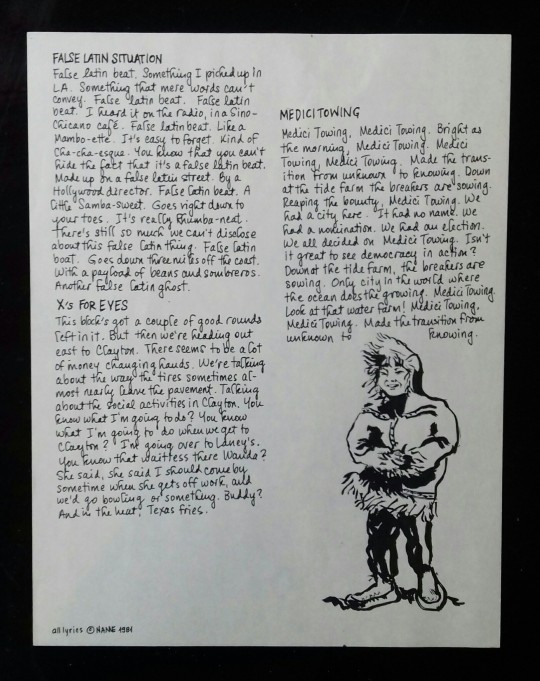
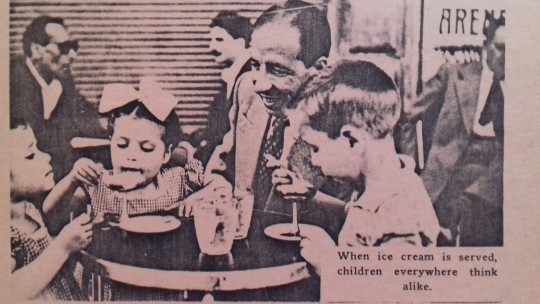
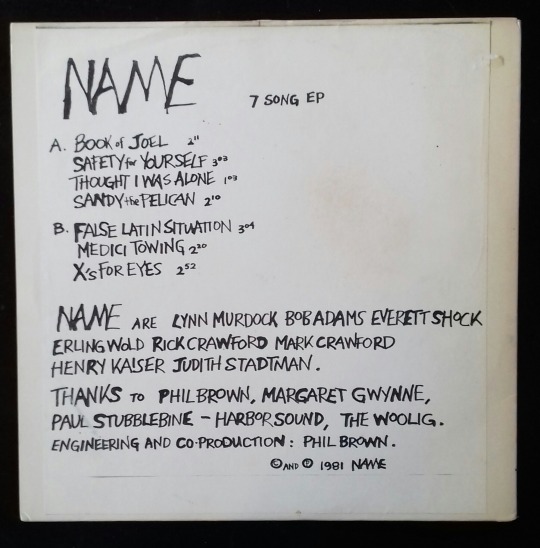
NAME
"7 Song EP"
(12". [self-released]. 1981) [US]
1 note
·
View note
Text
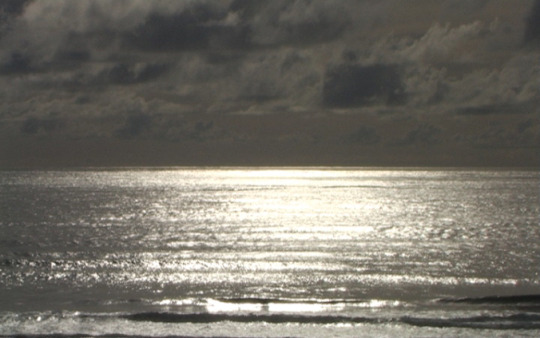
Homecoming was made in 2004, not long after I returned to the United States after 10 continuous years abroad, mostly in Italy, and Portugal and the UK. I’d returned after hearing from friends how bad things were in the post 9/11 lurch to the right. On returning not long afterwards the Iraq war began. This film was my response. I consider it one of my best films. After it was completed I was unable to get it shown in the US, in places that had previously happily shown my work. No American festivals would show it. 2004. The curtain of our cultural police state was closing, and it was clear. For my thoughts on the making of this film, and the reception it received, see this.
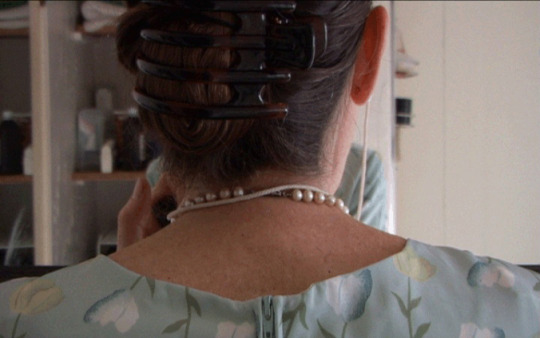
Set in Newport, Oregon, a small coastal town whose fishing fleet has vanished, and survives on second-homes and tourism, HOMECOMING is rooted directly in the present realities of America. We are introduced to a normal family: Jeff (Keith Scales) and his wife Mattie (Kate Sannella), and son Chris (Ryan Harper Gray). Jeff runs a small real estate office and his wife shares the work. Chris is an unemployed 26 year old slacker, living with a younger girlfriend, (Kat Eastman). Obliquely we learn of another son, in the service, “over there.” Mattie discreetly does bit of drinking, Jeff hustles his business. Mattie fails to get some papers to the bank and Jeff’s company loses out on a $50,000 deal. Chris is dumped by his girlfriend and in counseling with a social-service therapist (Steve Taylor). We find out that Chris is Jeff’s step-son, and his own son Steve is the one in Iraq.
Steve’s homecoming is in a transfer tube. After the funeral the family gathers by the ocean and the fissures within rip apart. Jeff and Chris have a confrontation that leaves Chris with a bloody nose on the ground. Mattie drinks and ends on the floor herself as Jeff loses it. Chris visits his therapist at home and ends up getting a blow-job. He stops by and sees his old girlfriend in an attempt to make up. She turns him down. Chris jumps of a bluff known locally as “Jump Off Joe’s”
HOMECOMING is not a “plot” film, but more a tone-poem; its meanings arise from its broader ambience, its moods, its sense of time and place. It is meant as a metaphor for the larger family of America, which, at this time, is harshly divided, and unable to speak to itself meaningfully across that division. This film broaches this subject poetically, gently, through a depiction of characters who are unable to articulate to each other or to themselves the disquiet which curdles within them.
HOMECOMING
2004 | Digital Video | Color | Sound | 104 minutes
Producer, Director, Camera, Editor, and Sound : Jon Jost
Music: Erling Wold
With: Ryan Harper Gray, Kathryn Sannella, Keith Scales, Kateri Eastman, Steve Taylor
Shown at: Premiered in Cinema Digitale section of the Venice Film Festival, Sept. 2004.
HOMECOMING (Jon Jost, 2004)
Dennis Grunes, Portland Or.
Jost has said that the emotionally ripped-apart families in both The Bed You Sleep In and Homecoming are metaphors for America itself. The film ends with a printed indictment of key members of the Bush administration, calling their actions pertaining to the murderous invasion and occupation of Iraq both impeachable and treasonous.
The family in Homecoming is never given a family name. It is a family that is not a family—a loose suspension of isolated individuals rather than a functioning combinate organism. It is also a blended family consisting of Jeffrey, a businessman, and Mattie, who works as her husband’s secretary, and Mattie’s two sons. Steve is also Jeffrey’s son; Chris, who at 26 is six years older than Steve, is not. On the other hand, Chris’s stepfather is the only father that Chris has known. The absent biological father, whom Chris considers visiting in Anchorage, Alaska, is a presence in the film—an invisible part of the blended family, especially insofar as Chris, who is unemployed and irresponsible, is a bone of contention between Jeffrey and Mattie, and the absent biological father more or less sums up the difficulty between them. If I were to apply traditional terms to the narrative, I would have to say that the film’s protagonist, who is also absent, is Steve. He constitutes an even weightier presence in his absence than Chris’s father does.
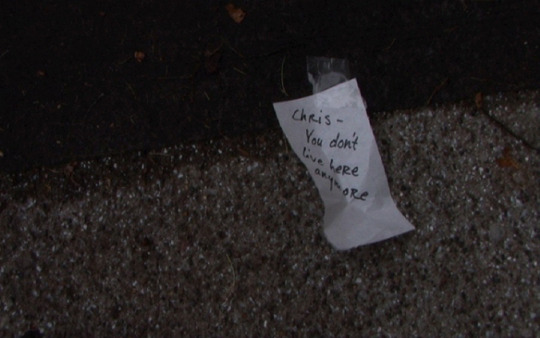
Steve’s death in Iraq—he is drowned as the result of a ludicrous transportation accident—and his burial in Oregon (we never even see the corpse) provide the occasion for the family’s grave-site implosion. To cope with his loss, Jeffrey obsesses on the letter about Steve that he and Mattie received from Steve’s commanding officer; having just buried his son, Jeffrey insists he will write the CO to thank him. The distribution of characters within the burial frames stresses the lack of family unity, even in grief; but Chris, at a considerable distance from and not facing his mother and stepfather, seems especially alienated. Nevertheless, he makes an overture for family inclusion, asking Jeffrey, when he writes the CO, also to thank the man on his behalf. Throughout the film, one character shuts another out cold, and here again it happens. Jeffrey tells Chris to write his own letter. He thinks he is chastising Chris for not taking individual responsibility, but he is shutting out the boy from what is left of the family, oblivious to the healing potential in shared family grief and, most cruelly, oblivious to the fact that, just as he has lost a son, Chris has lost a (half-)brother. Chris, fragile to begin with, explodes, giving full expression to his disgust with the war and to the pointless, unnecessary circumstance of his brother’s death. It is a defense of his bond with his deceased brother, but Jeffrey hears instead a verbal assault on his lost son. To retaliate, Jeffrey shuts out Chris further and harder, referring to Steve as “my son,” in effect assaulting Chris with the fact that Chris is not his son. A low-level shot of a small American flag planted at Steve’s burial plot flings back and forth in improbably contrary winds, as if shaking its banner to say “No!” The colors of the flag—red, blue and white—match the colors of the cap that Chris wears throughout the film—this, the symbolical connection of brothers that the father of one boy and the stepfather of the other cannot grasp because of his solipsistic sense of family. (For Jeffrey, the paramount issue is that Steve embraced his values and Chris has not.) At another burial later on, another grave-site will be adorned by both a flag and the cap: a fatality of the two wars, the one in Iraq and the one at home.
Jost is not a reductive filmmaker but an expansive one who is drawn to realistic complexities. Chris’s suicide, at one level an attempt to mimic his brother’s death, is (in the Freudian sense) over determined; it is the result of both a train of events and a complex of motivating factors, including Chris’s rejection by a former girlfriend. This is not a simple film in which Bush II’s Iraq war causes this and that at home. Rather, the war enters the mix of human lives, contributing to their disastrous course along with a great many other factors—all the problems, in fact, that predated this latest U.S. military misadventure. There is even an elusive sense that the war, a kind of immense distraction, is somehow an attempt to escape or evade the problems at home.

I hate the term “experimental filmmaker,” because it makes Jost and other filmmakers whose work I cherish sound like mad scientists trying willy-nilly to see what works on screen. Like Chaplin, Ford and Welles, Jost is an expressive artist. As is his wont, for Homecoming he has marshaled an artillery of distancing devices that (properly) undermine the narrative flow and the capacity of films to lull the viewer into a comfortable, cozy feeling. No one could ever mistake his work for that of Spielberg or Zemeckis. Jost wouldn’t be caught dead flattering our vanity, or his own, by encouraging in us, his audience, simplistic, self-congratulatory responses. He doesn’t make films in order to manipulate us; he makes films in order to express his ideas, his way of seeing things, so that he can share these with us. (Manipulating, sharing: two opposite motives in filmmaking.) Jost doesn’t want us to be drawn into his scenes of family crisis in Homecoming; he wants us to stand sufficiently outside, and be sufficiently alert, to grasp these scenes of crisis, to plumb their depths. So rewarding, his art is also stringent, demanding. Thus he gives us, among other things, the following: images that seem to disintegrate before our eyes; “place” shots that, at first, seem like Ozuvian inserts but by their number accumulate into a visual character that helps explain the lives unfolding in their midst; split screens, with the camera seeming to move from one full-frame image to another full-frame image that provides another perspective on the same event, or some new but related activity; scenes where one character is audible but another, with whom the first character is speaking, isn’t, where we must take pains to watch as well as listen so we gather up the combinate gist. (I am reminded of one of my favorite films, Michelangelo Antonioni’s 1975 The Passenger, where we sometimes must rely on what we hear because the crucial visual information is just beyond the view of the camera.) More restrained than in the past, Jost is careful not to dazzle us with flights of technical virtuosity; but he does ask that we, his audience, fortify ourselves with a good draught of Keatsian negative capability.

One of the qualities of Jost’s cinema is its ambiguity—not the manipulative kind that tricks an audience (the Sixth Sense-kind), but the kind that approximates the richness, the complexity, the mysteriousness of human reality. Hence, the elliptical nature of his filmmaking, as when we can’t quite hear what someone is saying, or when someone asks a question and a cut keeps us from hearing the answer. One of my favorite ambiguities in Homecoming may be of my own invention, but Jost’s kind of filmmaking certainly encourages the mood that predisposes me to “discover” it. Jamie, Chris’s girlfriend, is as hard a worker as Chris is not; she cleans motel units. Jamie lives in a house that her parents left to her. Behind the glass in a door we see a “Bush-Cheney” sign, one that is exceedingly small and, with the “Cheney” part partly out of view behind the wood of the door, seemingly half-hearted. What does it mean? Is Jamie for Bush? It would seem so, except for the size and only partial visibility of the sign. These exceptions led me, at least, to a marvelous train of conjecture. We first see Jamie reading a book—and not the New Testament; can someone who reads—someone who works hard, in her spare time—possibly be for Bush? If not, is the Bush sign a token of respect for the political inclinations of her deceased parents? Or is it protection against communal outrage? (In suburban Shreveport, Louisiana, my brother and his wife had their Kerry-Edwards lawn signs stolen, and when they repeatedly replaced these, the community culprits, à la KKK, burned the signs, jeopardizing the Gruneses’ home, their lives and the lives of their pets.) There is more to this possibility of communal outrage. Solipsistic (like his stepfather), Chris seems oblivious to Jamie’s reality, even as he attempts to reconnect with her following his homosexual seduction by a court-appointed psychologist. (We never know what offense Chris committed.) But we think we know something that Chris doesn’t; it is at least possible that Jamie herself is working her way through to a fuller understanding of her own sexuality. The “Bush-Cheney” sign in her window, then, may be a reflex of denial or an attempt to protect herself from judgment in her community. It’s ambiguous. I don’t know. I like not knowing, because human nature is ambiguous, and because Jamie herself may be at an indeterminate point in a process of self-discovery. But that’s me; I also like not hearing all the dialogue with perfect clarity, because I don’t find it necessary to hear every word when the human emotions involved come through clearly enough. The friend with whom I saw the film, also a fan of Jost’s work, did not feel the same way.
Given the film’s postscript (sober and straightforward, unlike the poetical postscript, say, that ends Jost’s otherwise tremendous 1990 Sure Fire), we can find nothing ambiguous about how Jost feels about the war. As I do, Jost opposes the U.S. invasion and occupation of Iraq, whose motive, he believes, was the enticement of Iraqi oil. I would add only that George W. Bush was as interested in lining the pockets of cronies in the Texas oil industry as he was in meeting the energy needs of a nation that has been slow to develop alternative sources of energy. I quote from Jost’s online journal (May 19, 2004): “Meantime[,] the news pours forth the ugly truth which our moralizing President, a self-claimed Christian busy doing God’s work, so he would claim, has set into motion. America has, again, become a spawning ground of violence, inflicting horrors on others while piously claiming otherwise. In blunt words highest members of our government—Cheney, Rumsfeld, Wolfowitz, Bush[—]are in any legitimate sense of the [term] war criminals, and should be tried no less than those who were tried in Nuremberg or Tokyo, and should be sentenced appropriately. Mr. Bush, known for his eagerness to use the death penalty in Texas, would certainly be eligible for such a sentence. In the meantime[,] impeachment is more than in order.”
Jost’s Homecoming isn’t polemical, however. It doesn’t thrash out, overtly, the American quarrel over a war that, coupled with Bush’s obscene tax cuts for the rich, has drained the nation’s financial resources to a level of astounding (and record) budget deficits, in addition to creating a high number of American casualties and murdering 100,000 innocent Iraqi men, women and children. Days before Bush’s 2004 election, because of the repeated lies of those in his administration, especially a truly demonic vice-president, 62% of Americans still wrongly believed that deposed Iraqi leader Saddam Hussein had participated in some way in the planning of the 9/11 attacks on the U.S. in 2001. In the film, we hear on the radio about the capture of Saddam Hussein. A soldier who participated in that event has come home to his family—alive, unlike Steve. The ridiculousness, the horror, the unfairness of war thus all comingle.

This is a beautifully acted film, but I can’t tell you who plays what part because I’m unable to locate any cast list. Those who play Mattie and Chris give the film’s two best performances. It is a bonus that the actor who plays Chris looks like a young Tom Cruise, because this adds a persistent jab at the kind of movies in which Cruise appears. The person who plays Chris, unlike Cruise, really can act. Here is the cast listing: Ryan Harper Gray, Kathryn Sannella, Keith Scales, Kateri Eastman, Steve Taylor.
Homecoming was shot using digital video. Video is looking a whole lot better than it used to.
There is unlikely to be a better American film in 2004 than Homecoming.
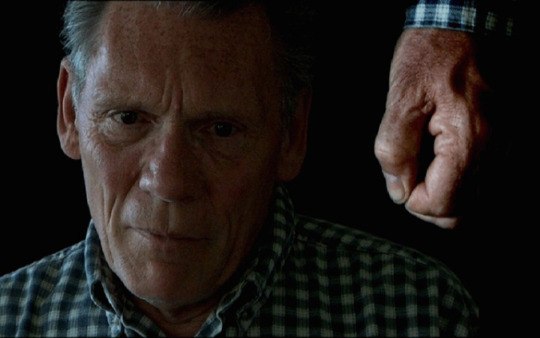
From some non-critic viewers:
“I watched ‘Homecoming‘ tonight and was quietly wowed. I will post more on this when I have some time to reflect a bit more. For the moment, I will say that I watched this with a friend of mine- intelligent guy with largely mainstream tastes- and not only did he like it, he was shocked that the movie has not found some kind of distribution.”
March 28 05
“Thoughts on Homecoming. Long post.
I don’t know if there’s anything here to add to what’s been said, but here it is, ordered from general to specific, sort of. I’m primarily a visual guy, so I started with that. I’m waiting for a few thoughts from my friend who also watched it. I’ll put those up later.
Thoughts on Jon Jost’s Homecoming
-Visually, a benchmark that everyone who uses DV might want to try and live up to. Does not go for any cheap and cliched “film-look”, but it’s certainly a different creature than the normal fare shot on video. I felt that it had properties both digital and organic (hand-crafted), if that makes any sense whatsoever. I’m familiar with lots of “underground” productions, where the intent is generally to mimic the look and feel of Hwd. movies. The result, when those that make them feel they have succeeded, usually has all the beauty of a local TV news segment, with a generic and formulaic “style” that may or may not move the story. “Homecoming” is simply a beautiful movie (though never to the point it overwhelms or distracts from events), doing things with DV I haven’t seen before- making me, at least, want to do a lot more experimentation, and fast. It’s a clean glass of water when you’re used to drinking flat soda. Favorite image: the trees passing by while the mother and father are driving. A close second is one shot of the ocean that seemed darker than the others, or the cleaning montage- tough call!
-Content-wise (story, plot or whatever to call it), I found the movie to be very accessible, compelling, and to follow a logical course to its tragedy ending. “The plight of the family” = “The plight of the nation” was a clear metaphor, and I thought the end title cards fit with the message. If I’m not mistaken, some critics or festival programmers had believed these to be incongruous with the movie, but they really must have dozed through it, because to me it seemed almost inevitable and responsible (in terms of pose a question or problem and offer the beginnings of a solution). This direct method, creator addressing audience, was much better than some lame-ass soliloquy delivered with ham-fisted earnestness that most audiences have come to expect. Also, I was surprised there was so much humor in the movie, but maybe that’s just me (I have a tendency to laugh inappropriately).
-I found most of the acting to be very nuanced, and subtle and convincing. Characters had complex and contradictory reasons for doing things- there were no one-noters. An exception is the man who is discussing the price of lumber- his delivery was stiff, and amidst the fine performances, this stands out. Also, I felt that during the “explosion” scene at the funeral, some of Chris’s remarks were a bit too on the nose (this was debated between me and my friend who watched it- he felt it fit Chris’s character to deliberately escalate things to get a reaction, and I can see that). I felt the father character was well-drawn and very real- I’m sure everyone knows at least one person like that. Steve’s counselor was “off” just enough to make him sinister in a banal way.
-Technically, there were some issues with the sound most noticeable in the first half or so. I don’t see why this couldn’t be fixed, and I attributed it to some of the problems experienced during the assembling of the movie (HD crashes, having to re-edit, etc.). There was one pan in the movie that I thought started abruptly (I actually only remember that single panning shot).
-This movie is really encouraging to try and push what one can get out of DV. Also, it makes me see how far I need to go yet to get satisfactory performances out of people. Overall, I think it’s a real success. It’s too bad it doesn’t have a home (distribution) as I think there’s an audience for it.
-“Homecoming” is the first really good narrative movie I have seen on DV. ”
Joshua, Indianapolis, Indiana, March 31 05
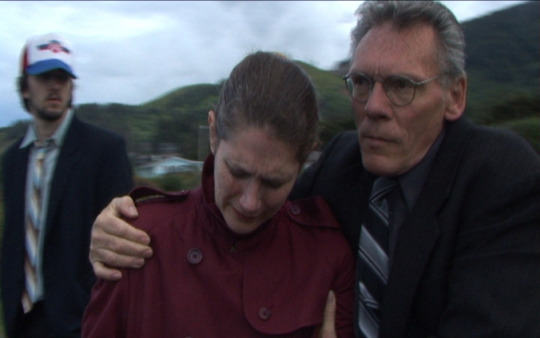
BTW, watched Homecoming again and wish to mention the long silence scene (kitchen table). bravo for having the guts to even include that, as it really allows the willing viewer to sink into the emotional water and pacing of the movie, and helps to make the whole feel even more natural and realistic. The fact that a friend whom I showed it to got all antsy and wanted it to move on goes to show that the common ways of doing things has somewhat killed the use of intellect in modern average viewers. pretty sad and scary. they must be re-trained pronto.
Daniel Runyan, Jan. 2005
I finally had a chance to watch the film over the weekend. It’s painfully bleak. Therefore, honest. It cuts through the viscera like nothing I’ve encountered so far dealing with the psychic trauma and abuse inflicted upon average Americans by our government, our laws, our schools, our wars, our culture. The incalculable number of lives ruined, lost and terrorized, not by some phantom band of mad A-rabs, but by our collective Faustian ambition to dominate everything on this earth. One thing which I think the film captures rather well, particularly in the subtle and naturalistic performances, is the simplicity of most Americans. By and large, we are a humble and devout people. The great tragedy of the film is watching these characters ripped to shreds by forces they neither comprehend nor understand. I think the film handles this with great care, genuine respect, and a profound aching sadness for their plight.
On a formal level, I thought the film was beautifully rendered– I particularly liked the fluidity of the rolling edits. I need to watch it again on a better tv set or on screen at
I-House, even.
Michael Chaiken, programmer, Intl House, Philadelphia

https://vimeo.com/ondemand/124260
2004 – Coming Home Homecoming was made in 2004, not long after I returned to the United States after 10 continuous years abroad, mostly in Italy, and Portugal and the UK.
0 notes
Text

Hot on the heels of making All The Vermeers in New York and Sure Fire, in what appears in hindsight to be a somewhat feverish creative rush, I went again to shoot another feature, somewhat full of myself, thinking and telling friends, I was out to make a masterpiece. Brian DePalma was saying the same thing then, referring to his in-production film Bonfire of the Vanities. Oh well…. I researched in Newport, Oregon, a film to be set in Toledo, a nearby paper and lumber-mill town. Beginning with a somewhat inchoate idea, vaguely rooted in the at-the-time mania about “recovered memory” in relation to childhood abuse, the result was The Bed You Sleep In.

The Bed You Sleep In
1993 | 35mm Panavision | Color | Sound | 117 minutes
Writer, director, editor and cinematographer: Jon Jost
Music: Erling Wold
With: Tom Blair, Ellen McLaughlin, Kate Sannella, Marshall Gaddis, Thomas Morris, Brad Shelton
Official selection: Berlin, San Francisco, and Sundance Film Festivals
Set in a small lumber mill town in Oregon, The Bed You Sleep In is an examination of a family facing a crisis – an accusation of deep and profound impact against one of its members. Along the way a portrait is rendered of the town, discreetly revealing its qualities, for better and worse. While doing so in a very oblique and indirect manner, the town and the family are surrogates for the larger community of America and its family of citizens. Moving slowly and stealthily, The Bed You Sleep In lays out its pieces, inviting the viewer to think for themselves. When the accusation arrives, a tragedy ensues, sweeping the family to the abyss.
“It would be wrong to claim that Jon Jost’s extraordinary The Bed You Sleep In is an underrated film within the Australian film scene – it would be truer to say that, so far, it’s unrated, virtually unknown beyond a small circle of Cinémathèque members.
Jost is a true maverick of American independent filmmaking, but sadly for Australians he’s an unfashionable maverick whose films are beyond the pale of almost all art-house distributors and exhibitors in this country (and elsewhere, I suspect). And it seems that, especially in the case of this film, the condition of cultural ignorance and neglect may be virtually global.
The Bed You Sleep In is the final installment in what some call the Tom Blair Trilogy, named after the remarkable (and little known) actor who has incarnated several faces of American male psychosis in two previous Jost films, Last Chants for a Slow Dance and Sure Fire. Taken together, these three films form one of the greatest, most important and powerful bodies of work in all cinema.
The Bed You Sleep In also marked Jost’s departure from the US. As a farewell letter, it is surely one of the darkest, most profoundly despairing documents that American culture has ever produced. Not for nothing did Jonathan Rosenbaum title a catalogue note on the film, “The Tunnel at the End of the Light”.
The story traces an allegation of sexual abuse within a family that is living in an economically declining, Oregon lumber mill town. The film charts a double, auto-destructive tragedy: a family that tears itself apart, mirrored by the signs of a slow but terrible ecological disaster.
Jost tackles what I think is probably the single most difficult topic to dramatize on screen – child abuse, and especially the repressed memory of that abuse. This is an area that can be construed in so many wildly different ways – in terms of whom in the scenario one chooses to believe (the child who comes forth with the charge or the parent who protests innocence), the sorts of motives one imputes to the players (is the child on a petulant revenge kick? Is the patriarch at last showing his true, rotten colours?), and in the kinds of moral and social lessons that one decides to draw from it (is the family unit inherently corrupt or inherently civilized? Is feminism warping minds or honing them? Is righteous, ideological paranoia destroying everything that is good or opening our eyes at last to the truth?).
I don’t think Jost, finally, is in control of all the implications of narrating a plot (in however open a form) out of these awful, almost unfathomable issues; his film is unsettling in part because of that lack of control. He deliberately leaves everything unresolved and ambiguous, as Otto Preminger might have done in less psycho-gothic times than ours. Where Jost ends up is with the stasis of absolutely wrenching, wretched despair, complete hopelessness and helplessness, especially where the masculine condition is concerned: few images in cinema have shook me more than the climatic shot of Blair the ‘monster’ reaching a hand down into a pool of water and bringing it up to splash his face, as if to wash his soul clean, at the end of so much sadness and devastation …
But Jost also reaches beyond the turbulence of the dramatic or diegetic illusion to perturb the film form itself. Going far beyond the frozen, burning frame that concluded Monte Hellman’s Two-Lane Blacktop (1971), Jost gives us an entire scopic and aural regime that is slowly bending, cracking and coming apart under immense psychic strain. His use of depopulated landscape shots, in particular, generates a true, deep dread that surpasses any of the horrific grace-notes in the oeuvre of David Lynch (whose Twin Peaks film and TV series offer many points of close comparison with Jost’s tale).
The Bed You Sleep In is in every respect a brilliant, corrosive work – one of the most remarkable films of the 1990s.”
Adrian Martin, November 1995
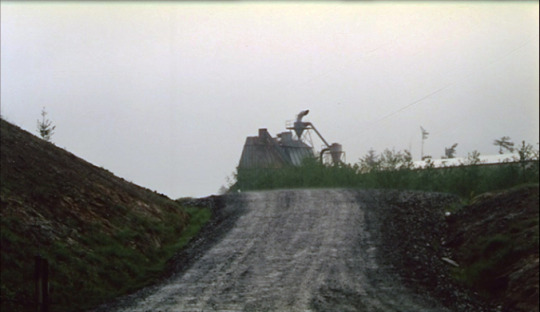
“The final film in an informal trilogy starring the phenomenal Tom Blair (the other two films in the series are Last Chants for a Slow Dance and Sure Fire), The Bed You Sleep In illustrates the deep frustration about America that drove director Jon Jost to relocate to Europe shortly after it was made. As in the first two films, this one tries to get at the roots of America’s social and political ills through the portrayal of one man’s life. On the surface, Blair’s character, Ray Weiss, is much more sympathetic than the ones he played in the previous two films, but his job as the manager of a lumber mill (albeit a nature-loving one) being driven out of business by foreign competition and clear-cutting places him in a can’t-win situation. He either has to destroy the nature he loves or lose his livelihood. His dual nature is reflected in the visual scheme of the film, which includes many landscape shots composed as diptychs. This is one of Jost’s most powerful portraits of the slow pace and underlying sadness of small town life, both of which are beautifully depicted in a remarkable scene in the town’s diner, made of a single, languid tracking shot encompassing the diner’s interior while life simply goes on both within and beyond the camera’s view. When the letter from his daughter arrives accusing Ray of incest, it hints at an even more violent split within his nature, one that, in Jost’s view, is symbolic of the violent divisions threatening to undermine America’s nobler ideals.
Tom Vick, All Movie Guide
“This really is a most extraordinary film. I found it in the university film library back when I was studying English Literature in 2009: this little gem was nestled in what looked like a knock-off dvd case – the cover looked like it had been designed using clip art. I had no idea quite how obscure it was until I made this list: research has yielded very few reviews and very little information.
Set in a sleepy American town, this film dissects the American dream through its candid study of an American family and the town in which they live. One day, a shocking accusation arrives, sending the family spiraling into despair and tragedy. But who is telling the truth? Camerawork seems telling here, but it is ultimately left to the viewer’s discretion. There is no soundtrack to this film, and conversations are delivered in a realist style, reminiscent of Bergman’s Autumn Sonata. Far from stark, however, this film uses colour and exquisite cinematography to imbue its portrait of tragedy with a kind of stillness. The film is quiet in tone, and highly textured in its delivery. Directed by Jon Jost, it can be bought directly from his website and from Amazon.”
Writer and source unknown
“This 1993 feature certainly has its flaws–including a wholly unnecessary literary quotation that appears on-screen at the worst possible moment–but it’s still one of maverick independent Jon Jost’s most forceful efforts to date, in part because it stars the most talented actor he’s ever worked with, the resourceful Tom Blair. Mainly known as a stage actor and director, Blair also starred in two of Jost’s best earlier features–as a wandering, jobless malcontent in Last Chants for a Slow Dance (1977) and as a misguided, bullying real estate speculator in Sure Fire (1990). Here he rounds out a loose trilogy of Jost’s corrosive, speculative self-portraits by playing a more sympathetic and ostensibly less alienated character, the owner of a lumber mill employing 60 workers, though the consequences of his situation prove to be even bleaker–and this time they can’t be so confidently traced back to his own character. A tragic, beautiful, and mysterious film that alternates between all-American landscapes (many of them composed as diptychs) and an unraveling nuclear family, this is as evocative and apocalyptic as Jost’s cinema gets–a film full of unanswered questions that will nag at you for days even as it makes fully understandable the sort of feelings about this country that drove Jost into European exile not long after it was completed. It’s part of the aching horror and lucidity of Jost’s vision that he can’t regard himself and the U.S. as wholly separate entities. With Ellen McLaughlin and Kate Sannella.
Jonathan Rosenbaum, Chicago Reader
The Bed You Sleep In is very much the work of the same individual but, as mentioned above, is very different in tone. The narrative revolves around the character of Ray (played by the truly remarkable Tom Blair, whose only prior features to the best of my knowledge are Jost’s Last Chants for a Slow Dance and Sure Fire), owner of a financially distressed lumber mill. In a scene of astonishing power, Ray’s wife Ellen (played superbly, particularly in this scene, by Ellen McLaughlin) reads out a letter from his daughter who is painfully and emotionally accusing him of sexual molestation. (The manner in which the letter is read and the way in which the characters’ emotions play out are so vastly different from the ways a similar scene in a Hollywood film would do them that I can’t even begin to describe their effectiveness.) This event occurs just about halfway through the film, and the narrative threads leading up to and trailing from this scene are slowly, meditatively interwoven with masterful visuals of the landscape in and around the town and lumber mill. The cumulative power of the film is devastating.
From a Top Ten listing in Chicago, listed as #4 after Frameup as #3, author not known
NOTE: The available copy of this film has French subtitles burned in and is somewhat banged up. Sorry about that but it is 100% the erstwhile “producer” who is responsible for this reality.
https://vimeo.com/ondemand/123248
Fouled Beds Hot on the heels of making All The Vermeers in New York and Sure Fire, in what appears in hindsight to be a somewhat feverish creative rush, I went again to shoot another feature, somewhat full of myself, thinking and telling friends, I was out to make a masterpiece.
0 notes